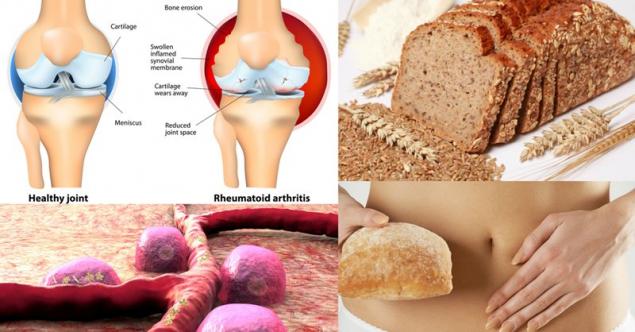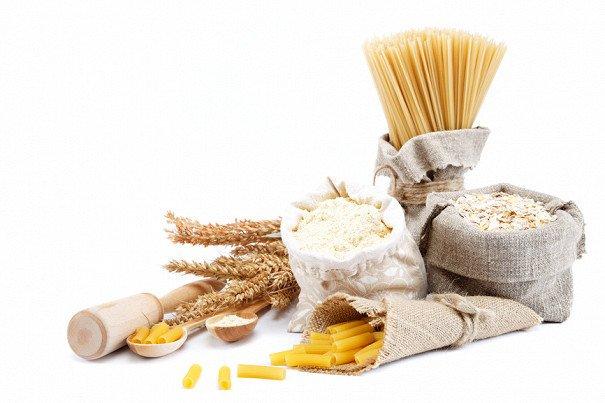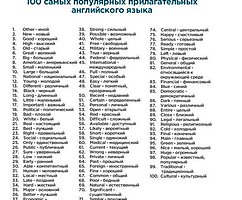Gluten: a danger lurks where you least suspect
 Bashny.Net
Bashny.Net
Sensitivity to the protein contained in wheat, rye and barley, is the biggest and least recognized threat to human healthWe tend to think that diseases the impact that can come for us at any time and without any reason. In fact most of them are associated with our diet and lifestyle, in particular with the fact that people eat too many carbohydrates.

Today we have more and more complicate life for our body products that are not designed for human beings. So, David Perlmutter, a renowned neurologist and expert on nutrition, says that the usual grain destroys the human brain. Under "modern" means not only refined wheat flour, pasta and rice, which have already recognized the enemies of those who struggle with obesity. Meaning and the grain that most of us think of healthy food – whole wheat, multigrain products, flour millstone grinding, the sprouted grain. In his book "Food and the brain. What carbohydrates do with health, thinking and remembering" on the basis of scientific facts he proves that the ideal is a diet extremely low in carbohydrates and high in fat. Published the main theses of this book:
"Gluten "invisible pest": you attack, you cause significant damage, and you don't even know it. Perhaps you already know that fast carbs is not healthy, especially in excess, but what about so-called healthy carbohydrates such as whole grains and natural sugars? When I tell people that sensitivity to the protein contained in wheat, rye and barley, is the biggest and least recognized threat to human health, the response I almost always hear: "it can't be. Not all sensitive to gluten. Of course, if you suffer from celiac disease, but it is rare..." And when I remind you that all recent research points to gluten as the trigger for the development not only of dementia, but also headaches, depression, schizophrenia, ADHD and even decreased libido, most of the interlocutors says: "I don't understand what you mean". They say so because they know only about the action of this protein on the intestine, and they know nothing about its effect on nerve cells.
A growing number of studies confirm the link between sensitivity to the protein and neurological disorders. This applies even to those who are good at learning the gluten. Most people certainly feel fear from the idea to go on a low-carb diet (imagine how you bite your nails at the thought of giving up favorite sweets), but this transition can be very easy: you can just take the bread basket, but you can replace its products which you may have avoided considering that they are harmful (butter, cheese, eggs, and wonderful healthy vegetables). And the sooner you change your diet and start to eat more fat and protein, the easier it will achieve many positive goals: effortlessly lose weight, achieve stable energy throughout the day, improved sleep and memory, increase creativity and productivity and more rapid operation of the brain. And all this in addition to protecting the brain.
What is gluten
Gluten is a complex protein that "glues" the grains of flour in the manufacture of bakery products. When you bite into a soft muffin or stretch the pizza dough, you owe it gluten. To see it with my own eyes, just mix the water and wheat flour, roll into a ball and then rinse it under running water to remove starch and fiber. In your hands will remain sticky mixture of proteins.

Sensitivity to gluten can cause damage in any organ, but it is not necessary to affect the small intestine, as in celiac disease . So, even if the person is not suffering from this disease, the body, including the brain, is in a situation of high risk. Usually in the base of the food sensitivity is the immune system's response to irritant. Another reason is the absence or lack in the body need enzymes digesting a particular product.In the case of gluten, its "stickiness" prevents absorb nutrients. Poorly digested food turns into a pasty substance, which irritates the mucous membrane of the small intestine. In the end you get abdominal pain, nausea, diarrhea, constipation, and other disorders. However, the intestinal symptoms were observed not at all, and their absence does not guarantee the security of other organs such as the nervous system. This creates suitable conditions for the development of many diseases.
The excess of gluten in the modern dietIf gluten is so bad and we've used it, how we managed to survive?
Response: we did not use this to gluten until our ancestors learned to grow and grind the wheat. Modern food production, including genetic engineering, has allowed us to grow grains that contain forty times more gluten than cultivated just a few decades ago. Can say for sure: modern grains containing gluten, are more addictive than ever. The use of such large quantities of grains and carbohydrates causes a much greater increase in blood glucose levels than meat, fish, poultry and vegetables.

When I give lectures to members of the medical community, I show them one of my favorite slides is a photo of four common foods: slice of wholemeal bread, a bar of chocolate, a tablespoon of pure white sugar and a banana. Then I ask participants to tell which product is causing the greatest rise in blood sugar levels or has the highest glycemic index (GI is a quantitative expression of the speed of increase of level of blood sugar after eating a certain food in comparison with the same indicator for glucose). In nine cases out of ten, people choose a wrong product. No, it's not the sugar (GI=68), not a chocolate bar (GI=55) and not the banana (GI=54). It's a whole grain bread with a huge KI=71, which puts it on par with white bread (and many think he is much better).
Where to find the enemynot only is the sensitivity to gluten is far more widespread than you think, it's almost all causes of potential harm and hides where you least suspect. Gluten is contained in condiments, ice cream and even cosmetics. It's disguised in soups, sweeteners and soy products. He hides in food supplements and branded drugs.The term "gluten-free" becomes so vague and diluted, as "organic" and "natural".

Here's what you need to remember:
The following grains and starches contain gluten: wheat and germ; rye; barley; bulgur; couscous; wheat flour; semolina.
The following grains and starches contain gluten: buckwheat, corn, millet, potato , rice, soy.
The following foods often containgluten: malt/malt extracts; prepared soups and broths (liquid or cubes); meat products; potato fries (which are often sprinkled with flour before freezing); processed cheese, blue cheese; mayonnaise; ketchup; soy sauce and teriyaki sauce; salad dressings; marinades; imitation crab meat; sausage; hot dogs; non-dairy creamer; prepared chocolate milk; cereal; breaded foods; fruit fillings and puddings; ice cream; energy bars; syrups; instant hot beverages; flavored coffee and tea; oat bran; toasted nuts; beer and vodka. published
Author: Maria Svetlova
P. S. And remember, just changing your mind — together we change the world! ©
Source: //letidor.ru/zdorove/a3456-vsya-pravda-pro-glyuten-6767.shtml

Today we have more and more complicate life for our body products that are not designed for human beings. So, David Perlmutter, a renowned neurologist and expert on nutrition, says that the usual grain destroys the human brain. Under "modern" means not only refined wheat flour, pasta and rice, which have already recognized the enemies of those who struggle with obesity. Meaning and the grain that most of us think of healthy food – whole wheat, multigrain products, flour millstone grinding, the sprouted grain. In his book "Food and the brain. What carbohydrates do with health, thinking and remembering" on the basis of scientific facts he proves that the ideal is a diet extremely low in carbohydrates and high in fat. Published the main theses of this book:
"Gluten "invisible pest": you attack, you cause significant damage, and you don't even know it. Perhaps you already know that fast carbs is not healthy, especially in excess, but what about so-called healthy carbohydrates such as whole grains and natural sugars? When I tell people that sensitivity to the protein contained in wheat, rye and barley, is the biggest and least recognized threat to human health, the response I almost always hear: "it can't be. Not all sensitive to gluten. Of course, if you suffer from celiac disease, but it is rare..." And when I remind you that all recent research points to gluten as the trigger for the development not only of dementia, but also headaches, depression, schizophrenia, ADHD and even decreased libido, most of the interlocutors says: "I don't understand what you mean". They say so because they know only about the action of this protein on the intestine, and they know nothing about its effect on nerve cells.
A growing number of studies confirm the link between sensitivity to the protein and neurological disorders. This applies even to those who are good at learning the gluten. Most people certainly feel fear from the idea to go on a low-carb diet (imagine how you bite your nails at the thought of giving up favorite sweets), but this transition can be very easy: you can just take the bread basket, but you can replace its products which you may have avoided considering that they are harmful (butter, cheese, eggs, and wonderful healthy vegetables). And the sooner you change your diet and start to eat more fat and protein, the easier it will achieve many positive goals: effortlessly lose weight, achieve stable energy throughout the day, improved sleep and memory, increase creativity and productivity and more rapid operation of the brain. And all this in addition to protecting the brain.
What is gluten
Gluten is a complex protein that "glues" the grains of flour in the manufacture of bakery products. When you bite into a soft muffin or stretch the pizza dough, you owe it gluten. To see it with my own eyes, just mix the water and wheat flour, roll into a ball and then rinse it under running water to remove starch and fiber. In your hands will remain sticky mixture of proteins.

Sensitivity to gluten can cause damage in any organ, but it is not necessary to affect the small intestine, as in celiac disease . So, even if the person is not suffering from this disease, the body, including the brain, is in a situation of high risk. Usually in the base of the food sensitivity is the immune system's response to irritant. Another reason is the absence or lack in the body need enzymes digesting a particular product.In the case of gluten, its "stickiness" prevents absorb nutrients. Poorly digested food turns into a pasty substance, which irritates the mucous membrane of the small intestine. In the end you get abdominal pain, nausea, diarrhea, constipation, and other disorders. However, the intestinal symptoms were observed not at all, and their absence does not guarantee the security of other organs such as the nervous system. This creates suitable conditions for the development of many diseases.
The excess of gluten in the modern dietIf gluten is so bad and we've used it, how we managed to survive?
Response: we did not use this to gluten until our ancestors learned to grow and grind the wheat. Modern food production, including genetic engineering, has allowed us to grow grains that contain forty times more gluten than cultivated just a few decades ago. Can say for sure: modern grains containing gluten, are more addictive than ever. The use of such large quantities of grains and carbohydrates causes a much greater increase in blood glucose levels than meat, fish, poultry and vegetables.

When I give lectures to members of the medical community, I show them one of my favorite slides is a photo of four common foods: slice of wholemeal bread, a bar of chocolate, a tablespoon of pure white sugar and a banana. Then I ask participants to tell which product is causing the greatest rise in blood sugar levels or has the highest glycemic index (GI is a quantitative expression of the speed of increase of level of blood sugar after eating a certain food in comparison with the same indicator for glucose). In nine cases out of ten, people choose a wrong product. No, it's not the sugar (GI=68), not a chocolate bar (GI=55) and not the banana (GI=54). It's a whole grain bread with a huge KI=71, which puts it on par with white bread (and many think he is much better).
Where to find the enemynot only is the sensitivity to gluten is far more widespread than you think, it's almost all causes of potential harm and hides where you least suspect. Gluten is contained in condiments, ice cream and even cosmetics. It's disguised in soups, sweeteners and soy products. He hides in food supplements and branded drugs.The term "gluten-free" becomes so vague and diluted, as "organic" and "natural".

Here's what you need to remember:
The following grains and starches contain gluten: wheat and germ; rye; barley; bulgur; couscous; wheat flour; semolina.
The following grains and starches contain gluten: buckwheat, corn, millet, potato , rice, soy.
The following foods often containgluten: malt/malt extracts; prepared soups and broths (liquid or cubes); meat products; potato fries (which are often sprinkled with flour before freezing); processed cheese, blue cheese; mayonnaise; ketchup; soy sauce and teriyaki sauce; salad dressings; marinades; imitation crab meat; sausage; hot dogs; non-dairy creamer; prepared chocolate milk; cereal; breaded foods; fruit fillings and puddings; ice cream; energy bars; syrups; instant hot beverages; flavored coffee and tea; oat bran; toasted nuts; beer and vodka. published
Author: Maria Svetlova
P. S. And remember, just changing your mind — together we change the world! ©
Source: //letidor.ru/zdorove/a3456-vsya-pravda-pro-glyuten-6767.shtml
Tags
See also
On the life under the slogan "I must!"
To turn the tide in their favor: how to respond to biased
10 barriers to healthy and beautiful belly
Children life in debt
Bodyguard for the Brain: Researchers have identified a mechanism that can protect the brain from aging
It is IMPORTANT to know! What are lectins, which contains and affect health
Grief can be inherited
5 so-called genius skills that can teach anyone
AGE products: how to recognize and avoid!
Metropolitan Anthony Of Sourozh. In a world of chaos, death, suffering, evil, incompleteness...
















